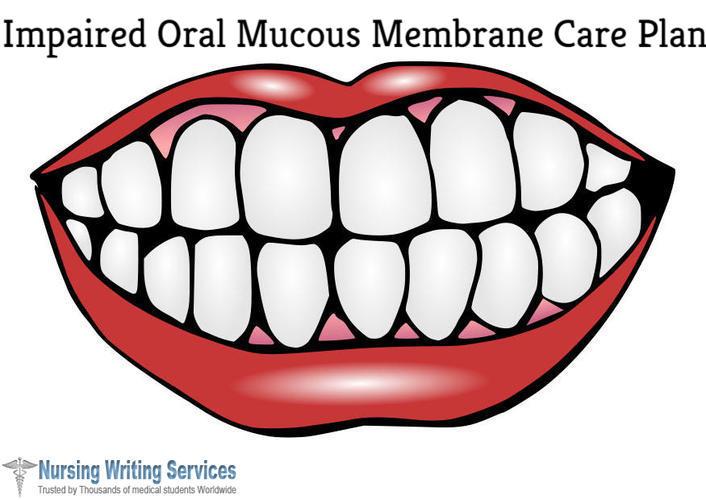Impaired Oral Mucous Membrane Care Plan Writing help online

The Impaired Oral Mucous Membrane Care Plan Writing Help Online is about a lining on the inside of the mouth consisting of an oral epithelium and lamina propria an underlying connectivity tissue. The impaired oral mucous membrane is a disruption of the soft tissue of oral cavity and or lips. Nursing Writing Services offers the best Impaired Oral Mucous Membrane Care Plan Writing Help Online
Irritations are indicators of the impairment when the oral mucous or oral mucosa has systematic conditions. Other numerous symptoms also appear when the oral mucosa has problems. Most of the impairments are viral and treatable.
Many factors contribute to the occurrence of infection oral mucous membrane including aging, lack of self-care, use chemicals such as tobacco or alcohol and medical conditions like cleft lip, dehydration or impaired salivation.
Impaired Oral Mucous Membrane Care Plan Diagnosis
When a nursing comes across a patient complaining of irritation on the oral mucosa, it essential to examine and inquire if these symptoms that indicate the existence of impairment are existing:
- Bleeding
- Discolored tongue
- Edema
- Enlarged tonsils beyond normal
- Dry mouth
- Discomfort, pain , lesions or ulcers on the mouth
- Bad , diminished or absence of taste
- Speech difficulty
- Bluish or red masses
Impaired Oral Mucous Membrane Care Plan Goals and Outcomes
The caregiver should aim to help the client in achieving a healthy oral cavity indicated by the following:
- Intact and moist oral mucous membranes without debris and ulceration
- Eliminate discomfort and inflammation on oral mucosa
- Patient demonstrates a measure to regain and maintain healthy mucous membranes
- Absence of lesions
- Patient swallows without any discomfort
- Reports of diminished pain and oral dryness
Impaired Oral Mucous Membrane Care Plan Patient Assessment
A care plan for oral mucous membrane should include a comprehensive assessment to determine the extent of infection by doing the following:
- Inspect the oral cavity daily to check for bleeding, edema, lesions or dryness: Oral inspection helps to reveal signs, symptoms, trauma and drug side effects and refer the case to appropriate physician
- Assess mechanical agents like chemical agents such as tobacco or ill-fitting dentures: The presence of these conditions increases or causes trauma to the oral mucous membranes.
- Determine and monitor the nutritional and fluid status and establish if it is adequate: Malnutrition and dehydration increase possibility of impaired oral mucous membranes.
- Establish if the patient has indicators of infections that could cause impairment of oral mucosa even if it needs the involvement of a physician: Herpes, candidiasis, gram-positive and negative bacterial infections are some of the ways that severe mucositis manifests itself.
Early evaluation of these manifestations allows for early and accurate treatment.
Impaired Oral Mucous Membrane Care Plan Interventions
These therapeutic nursing interventions help to reduce the effect and heal impaired oral mucous membrane.
Plan a thorough mouth care regimen after every meal and 4 hours while awake: Mouth care prevent formation of bacteria and oral plaques
Increase rinsing with a recommended solution between brushings and once at night if there are signs of mild stomatitis: Solutions help to promote comfort and reduce further damage.
Provide topics or systemic analgesics on prescription: Analgesics relieve pain and provide comfort
Use tap water or a normal saline for oral care: Commercial mouthwashes contain hydrogen peroxide that injures oral mucosa or alcohol as it causes drying of oral mucous membranes. Lemon sycerin swabs decrease oral moisture, salivary amylaise and erodes tooth enamel.
Mouth lubrication and moisturizing: Lubricating prevents dryness on the lips prevent drying and cracking. Maintaining moisture by frequent sips of water promptes cleansing effect of saliva and avert mucosal drying which causes fissures, lesions, and erosions
Encourage moth and teeth brushing with a soft toothbrush after meals and flossing at least one in a day: Brushing reduces plaque and controls periodontal diseases. If brushing or flossing cause much pain, you should stop it.
Urge the patient to take a vitamin and protein-rich diet: A balanced diet helps to promote healing. Encourage taking of lukewarm soft foods that do not require hard chewing and drinks with a straw.
When patients heal, a caregiver should teach them to implement and an appropriate oral hygiene plan which is significant to oral health. Education should include teaching patients to inspect oral cavities to monitor sign and symptoms of the impaired oral mucous membrane for implementation of early treatment.
Impaired Oral Mucous Membrane Care Plan Writing Help Online
Our professional Nursing Care Plans Writing Services is committed to making your life easier. We will cover your back as we offer original Impaired Oral Mucous Membrane Care Plan Writing Help Online regardless of how fast the deadline is approaching.

